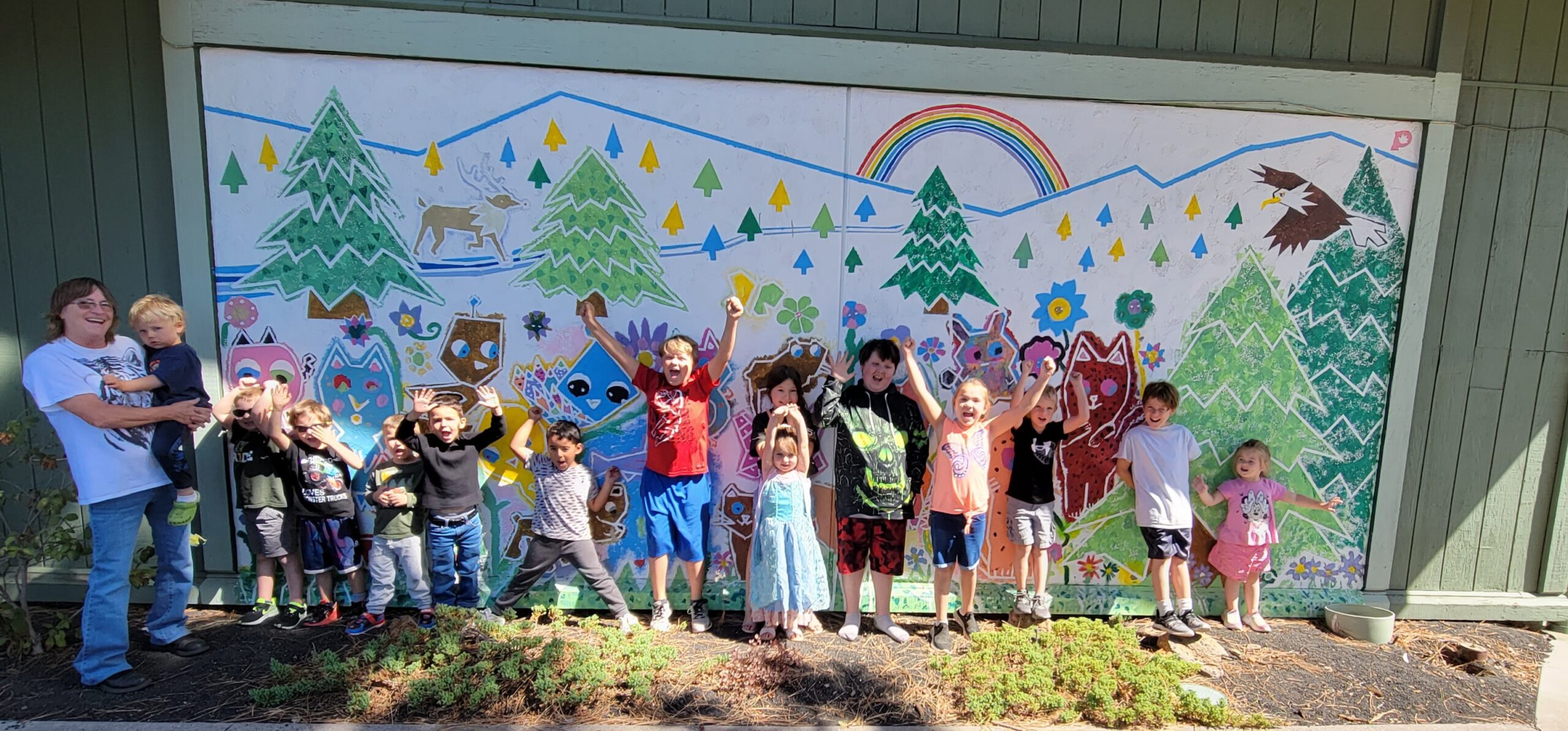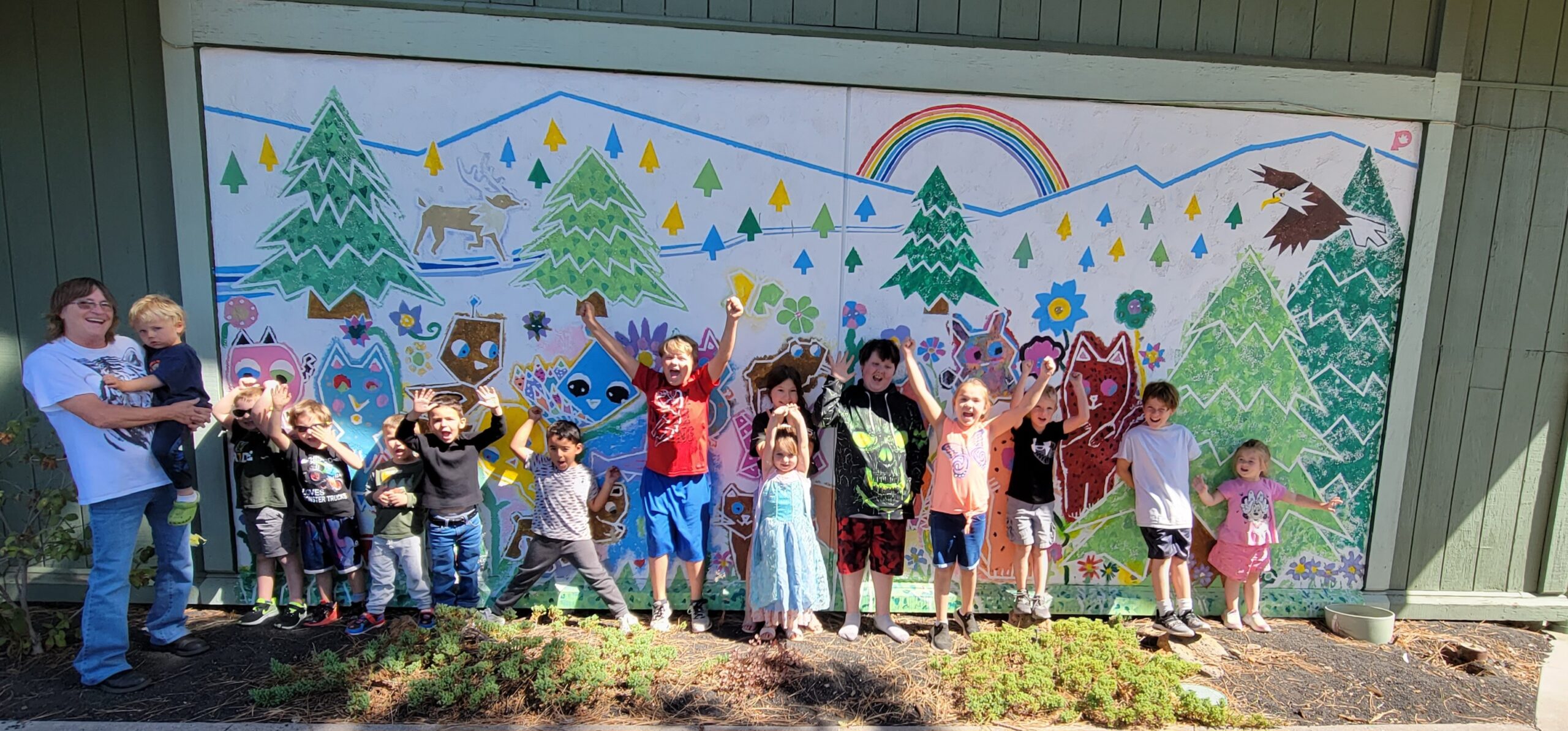Thanks to some quick action and collaboration, a small town community center is keeping its doors open.

On August 31st, 2023, the Tri County Community Network (TCCN) in Burney, California, posted to social media that they would have to close their doors unless they could raise $70,000 in a short amount of time.
This came as a shock to Megan Conn, the Program Officer at the Community Foundation of the North State. The CFNS is responsible for managing and distributing funds to charitable organizations in Northern California. They have worked with the TCCN on grants in the past.

The front doors of the Tri County Community Network in Burney, California
Recognizing the Challenges
“Burney is a small, underserved community in the mountains in Northern California that has historically been economically based on logging and forest extraction. In recent years, they’ve had challenges with wildfire mitigation and the pandemic. The TCCN is a nonprofit family resource center that offers programs and support to low income and working families, including affordable childcare after school and throughout the summer,” Megan explains.
About 3,000 people live in Burney, and more than 50 families rely on the TCCN for childcare. They also provide job training, resume review, and they help community members find work if they need it.
When Megan and the CFNS team saw the announcement, they realized that recent challenges nonprofit organizations are facing may be the reason for the potential closure.
“They’ve had challenges since one of their past CEOs passed away. There are also all the factors affecting rural childcare centers in this post-pandemic world, like staffing shortages, wage increases, increased demand on services, and inflation making it difficult for them to stay open,” she explains.

Some of the kids at the TCCN.
Assessing the Situation
“We looked at what we have available here at the Community Foundation to see how we could help. We have about 150 different funds and we work with the donors of these funds to distribute them to charitable organizations. Most of the funds are restricted to certain causes or geographic areas,” she explains.

The Community Foundation of the North State is based in Redding, California.
The CFNS opens up grant applications to local nonprofits and charities twice every year. It can be a competitive process, but their goal is to help as many organizations as they can.
“The Burney Regional Community Fund, which is supported by Pattern Energy, is specifically for supporting needs in the Burney area. We typically distribute those funds through our spring grant cycle and we make decisions with rotating panels of community volunteers to decide where those funds go,” she says.
Rather than tapping into this source, they realized they had another option.
“Separate from this fund is the Burney Regional Community Fund Endowment which Pattern Energy started. That fund earned about $25,000 this year so we were able to put this toward the cause,” Megan says.
These funds kicked off the fundraising efforts to help the TCCN get to their $70,000 goal. Along with matching gifts from other regional funders, the effort ensures that TCCN staff stay employed, children have a safe place to go, and parents can get to work without worrying about childcare..
“It’s such a blessing to have the support of Pattern Energy through this fund. We’re so grateful,” Megan says.
Coming Together
With over a third of the funds already raised, the CFNS focused on finding more organizations who could pitch in.
“We decided that we really needed to come together to help them get the rest of the money they need, so we reached out to about a dozen other organizations in our region asking them to help us raise another $25,000. After this ask, we ended up raising a total of $55,000 from seven organizations to help the TCCN keep their doors open,” she says.

Kerry Caranci, CEO for the Community Foundation of the North State.
When they called the TCCN to tell them the news, it was just in time. Members of the TCCN board were about to call families to let them know their doors would be closed the following Monday. Instead, they call the families with good news.
“A man called us to say thank you for helping TCCN. He has a son who is in transitional kindergarten and twin boys who are starting preschool next year. He wanted to say how much he appreciates everyone who helped keep the childcare center open so he can continue to go to work,” she says.
Responding to Immediate Needs
The quick thinking and action from the CFNS and the contributions from nearby organizations speaks to how important childcare is to the Burney community.
“Childcare isn’t fully funded by taxpayers so families often struggle to find care that’s within their budgets. Parents often have to make difficult decisions about leaving their job to stay at home with their kids rather than paying for child care because the cost of care can sometimes be more than what they earn at work,” Megan explains.
While the Community Foundation focuses on grant applications, they’re equipped to respond to emergencies as well.
“Typically we look at long-term impacts when we’re distributing funds, we don’t normally do emergency funding. But this one was just too important for the community,” she says.
Megan describes the people of Burney as very kind and caring towards each other. While they’ve had their share of challenges this year, including wildfires and a boil water advisory that closed businesses for several weeks, they continue to come together in times of need.
“We often do see people rally together in times of disasters, whether it’s wildfires or the pandemic. People do often come together rather quickly. What’s interesting about this situation is that while there isn’t a wildfire or pandemic at this moment, nonprofits are still really seeing these impacts. It’s just a difficult environment for them right now,” she says.
The CFNS receives many applications each year from groups of all kinds, many of which are grappling with the same challenges the TCCN is facing.
“Animal shelters, groups doing environmental work, arts and culture groups—they’re mostly all scraping by these days just trying to get by. We’re hoping that eventually we can help them out of these challenges so they can continue doing their great work,” she says.
Learn more about the Community Foundation of the North State and the Tri County Community Network by visiting their websites.